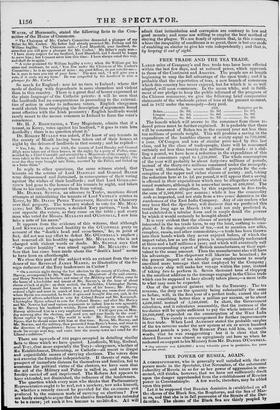FREE TRADE AND THE TEA TRADE.
LARGE sales of Company's and free trade teas have been effected within the last few days, and at reduced prices, which approach to those of the Continent and America. The people are at length beginning to reap the full advantage of the open trade; and it is probable that the exportation of teas, a new branch of commerce which this country has never enjoyed, but for which it is so well adapted, will soon commence. In the mean while, and in fulfil- ment of our pledge to keep the public informed of the progress of the Chinese commerce, we give the following brief comparative statements of the wholesale prices of teas at the present moment, and in 1832 under the monopoly—duty35.paid.
1932.
Reduction per lb.
Bobo, 3s. 9d
:Is. 3d
Hyson
Gs. 9d. 5s. 7d.
d Is. 2d. 1 s. Od. . Is. 611.
Congou 48. 6d 3s. 6 The benefit which will accrue to the consumer from these re- duced prices must be further explained. It is probable that there will be consumed of Bohea tea in the current year not less than ten millions of pounds weight. This will produce a saving in the expenditure of the humbler classes of seciety equal to 700,000/. a year. Of Congou and teas of similar price used by this last class, and by the class of tradespeople, there will be consumed certainly not less than twenty-five millions of pounds : at a shil- ling a pound, we have here a reduction in the expenditure of this class of consumers equal to 1,250,000/. The whole consumption of the year will probably be about forty-two millions of pounds, instead of the thirty-two millions consumed under the monopoly. There will, therefore, be seven millions of pounds for the con- sumption of the upper and richer classes of society . and, taking the reduction here at is. 2d. per pound, it will appear that a saving is effected in their expenditure which may be altogether stated in round numbers, although it be somewhat more, at 400,000/. The nation thus saves altogether, by this experiment in free trade, the sum of 2,300,000/. per annum ; while it has the commodity resh as imported, and not stale from a two years' detention in the warehouses of the East India Company. Any of our readers who may have filed the Spectator, will discover that we predicted this result as long ago as March 1830; and not only predicted it, but exhibited in a tabular form and in ample detail the process by which it would certainly be brought about* It is very evident that the classes of society more immediately interested in the tea trade have, to say the least, nothing to com- plain of. In the single article of tea,—not to mention raw silks, camphor, cassia, and other commodities,—a trade has been thrown into their hands which they never enjoyed before, of which the import value, low as are the prices, is unquestionably underrated at three and a half millions a year; and which will eventually call fora corresponding export of British manufactures, or their equi- valent to the same amount. Thus the manufacturer also will have his advantage. The shipowner will likewise be benefited ; for the present import of tea already gives employment to nearly one-third more tonnage than that employed by the Company ; while every ship will make her voyage within the year, instead of taking two to perform it. Seven thousand tons of shipping is the smallest addition to the tonnage engaged in the China trade which can be supposed to have already taken place,—a mere trifle to what may soon be expected.
One of the greatest gainers will be the Treasury. The tea revenue, the duty on the quantity being substantially the same
as before, will, in the first year of a perfect trade, exceed the old one by something better than a million per annum, or be about 4,600,000/. instead of 3,500,000/. In short, the Government calculates, and it calculates reasonably, that the increase of the tea-duties will be quite sufficient to pay the whole interest of the 20,000,000/. expended on the emancipation of the %Vest India Slaves. This surely is encouragement for further improvements in free trade. When Lord ALTHORP stated the probable surplus of the tea revenue under the new system at six or seven hundred thousand pounds a year, Sir ROBERT PEEL told him, in smooth words, that he was exaggerating : but it is clear that the shrewd Baronet was almost as egregiously out here as when he reckoned on support to his Ministry from Mr. DANIEL O'CONNELL.
• Our estimate nos 2,500.0001.; a very tolerable guess in prediction, five years berme the event.


























 Previous page
Previous page